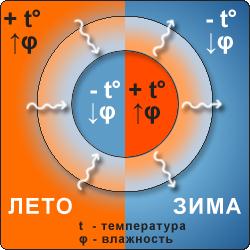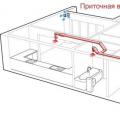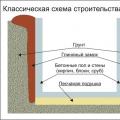Every day, the skin of each person is affected by various negative factors, such as weather conditions, the environment, and the ecological situation in the region of residence. The most negative effect on the skin is exerted by ultraviolet rays when exposed to the open sun or during normal tanning. But the influence of air humidity on the skin is also important, since there are many subtleties here.
Air humidity and skin
Of course, every person noticed that on hot days and dry weather, as well as when staying in a dry wind for a long time, one really wants to drink. The body at this time requires a large amount of fluid, as it loses water due to external natural factors and needs to replenish these losses.
However, even when drinking large volumes of liquid in the presence of dry air, skin cells do not have enough moisture to function properly, as it evaporates through the skin in large quantities.
Humidity is a measure of the amount of water it contains. This indicator is of particular importance for the general condition of a person and his skin, and also affects the degree of comfort of being indoors or outdoors.
For example, in the summer, on the hottest days, most people find it very uncomfortable to be outside because it is difficult to breathe. This is explained by the fact that when heated, the air is saturated with moisture (its evaporation from the surface of water bodies and soil), while the higher the air temperature, the more water it can absorb. As a result, on hot days, especially if it has rained before, people experience severe discomfort and breathing problems. Of course, this condition is also reflected in the skin, because due to the heat, increased sweating begins, which can lead to serious fluid loss.
Approximately the same thing happens in winter, when it is very cold outside. During this period, the humidity of the air usually decreases, because due to the low temperature there is no evaporation of water, but the air is also ready to receive moisture and absorb it. As a result, in the cold, due to the dryness of the air, it is very difficult to breathe. With breathing, a lot of steam comes out, the molecules of which are immediately absorbed into the air. As a result, the body loses large volumes of water. Air takes away water from the skin of the face, as well as from other open areas of the body. That is why after a long stay in the cold, as well as in the heat, the skin becomes dry and dehydrated.
As a rule, if the air temperature is high, but at the same time the air humidity is lowered, this is tolerated by people much easier and has less effect on the skin condition. At low temperatures, accompanied by a high level of air humidity, rapid hypothermia can occur.

What is the danger of a violation of the level of humidity
The most comfortable indicators of air humidity for a person's condition, his health and maintaining the correct water balance in the body and in skin cells is a value from 30% to 60%. If the indicators deviate in any direction, this can lead to various negative consequences.
At low air humidity, the skin dries out very quickly due to strong evaporation of moisture, dehydrates, begins to peel off and crack. As a result, damage to the skin appears, which is not always visible to the eye, but, nevertheless, opens up free access to the body for a variety of pathogenic microorganisms that can provoke the formation of an inflammatory process and acne, as well as infection with serious diseases.
In addition, with too high humidity in the hot season, the body sweats intensely, trying to cool the skin and protect it from overheating, not only losing water, but also forming a sticky film on the skin surface, on which dust and other impurities adhere. As a result, not only dehydration of the skin may appear, but also a large number of acne caused by blockage of pores and sebaceous ducts.
If the air humidity is high, the body begins to increase the release of heat simultaneously with the intense release of sweat, resulting in a serious risk of overheating. In this case, not only the human skin suffers, but the whole body. With a long stay in rooms with high humidity, a person may experience a general decrease in immunity, as a result of which not only skin diseases occur, but also various diseases of the internal organs, as well as an exacerbation of existing diseases.
Of course, it is impossible to state unequivocally that with an increase or decrease in the level of humidity in a person, skin problems will definitely begin, since each organism is individual and its reaction to certain changes in the environment is simply impossible to predict. The reaction of the skin of different people to changes in the environment will be different, and if a certain level of air humidity has a positive effect on the skin of one person, then it may turn out to be negative in relation to the skin of another person.
For example, with dry skin, a high level of air humidity will be useful, since the water in the air will become an additional source of hydration for the epidermis. A low level of moisture in dry skin will provoke the appearance of peeling and dehydration. In addition, moisture helps to smooth out wrinkles. However, with oily skin types, high levels of moisture can be a factor in causing acne. Therefore, quite often the condition of the skin depends on the humidity of the air in an apartment or other room.
In most cases, in winter, in apartments and houses, the air has a low level of humidity, which is facilitated by the operation of various heating devices. As a result, the skin becomes drier, thinner, and may show signs of aging. Therefore, in winter, the skin needs additional care, hydration and nutrition. It is also recommended to humidify the air in the apartment, using special air humidifiers for this, or simply placing containers with clean water in the rooms, the evaporation of which will provide additional humidity.

As a rule, in order to avoid undesirable consequences and complications, cosmetologists recommend adjusting to a certain level of air humidity, providing the skin with the necessary conditions. With a low level of humidity, the skin must be treated with creams and other products for deep intensive hydration and nutrition. Such products have a fairly dense structure, and their use helps prevent dehydration. However, with a high level of humidity, one should also not forget about moistening, especially in the summer. But here creams with a dense structure will not work. In summer, it is best to use moisturizing gels that quickly penetrate the skin and do not create unnecessary heaviness.




